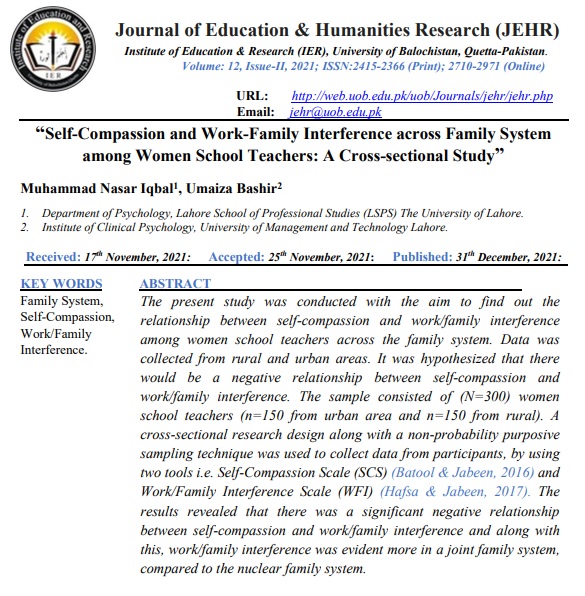Self-Compassion and Work-Family Interference across Family System among Women School Teachers: A Cross-sectional Study
Keywords:
Family System, Self-Compassion, Work/Family InterferenceAbstract
The present study was conducted with the aim to find out the relationship between Self-Compassion and work/family Interference among women school teachers across the family system. Data was collected from rural and urban areas. It was hypothesized that there would be a negative relationship between self-compassion and work/family interference. The sample has consisted of (N=300) women school teachers (n=150 from urban area and n=150 from rural). A cross-sectional research design along with a non-probability purposive sampling technique was used to collect data from participants by using two tools i.e. Self-Compassion Scale (SCS) (Batool & Jabeen, 2016) and Work/Family Interference (WFI) (Hafsa & Jabeen, 2017). The results revealed that there was a significant negative relationship between self-compassion and work/family interference along with this work/family interference was found more in the joint family system as compared to the nuclear.
References
Allen, T.D., Herst, D.E.L., Bruck, C.S., & Sutton, M. (2000). Consequences associated with work-to-family conflict: A review and agenda for future research. Journal of Occupational Health, 5, 278-308.
Boles, J.S., Howard, W.G., & Donofrio, H.H. (2001). An investigation into the inter relationships of work-family conflict, family-work conflict and work satisfaction. Journal of Managerial Issues, 13(3), 376-390.
Brion, J. M., Leary, M. R., & Drabkin, A. S. (2014). Self-compassion and reactions to serious illness: The case of HIV. Journal of Health Psychology, 19, 218–229.
Ciabattari, T. (2007). Single mothers, social capital, and work-family conflict. Journal of Family and Economic Issues, 28(1), 34-60.
Demerouti, E. (2004). Positive and negative work-home interaction: Prevalence and correlates. Equal Opportunities International, 23(1), 6- 33.
Eisenberg, N. (2002). Empathy-related emotional responses, altruism, and their socialization. In R. J. Davidson & A. Harrington (Eds.), Visions of Compassion: Western Scientists and Tibetan Buddhists Examine Human Nature (pp. 131–164). London: Oxford University Press.
Goetz, J. L., Keltner, D., & Simon-Thomas, E. (2010). Compassion: an evolutionary analysis and empirical review. Psychological Bulletin, 136, 351–374.
Greenhaus, J.H., & Beutell, N.J. (1985). Sources of conflict between work and family roles. Academy of Management Review, 10, 76-88.
Huang, Y.H., Hammer, L.B., Neal, M.B., & Perrin, N.A. (2004). The relationship between work to-family conflict and family-to-work conflict: A longitudinal study. Journal of Family and Economics Issues, 25, 79-100.
Jativa, R., & Cerezo, M. (2014). The Mediating Role of Self-Compassion in the Relationship between Victimization and Psychological Maladjustment in a sample of Adolescents. Child Abuse & Neglect, 38, 1180–1190.
Kanter, R. (1977). Some effects of proportions on group life: Skewed sex ratios and response to token women. American Journal of Sociology, 82, 965-990. Retrieved from http://www.jstor.org/page/journal/amerjsoci/about.html
Leary, M. R., Tate, E.B., Adams, C. E., Allen, A.B., & Hancock, J. (2007). Self-compassion and reactions to unpleasant self-relevant events: The implications of treating oneself kindly. Journal of Personality and Social Psychology, 92, 887–904.
Mesmer-Magnus, J.R., & Viswesvaran, C. (2005). Convergence between measures of work to family and family-to-work conflict: A meta-analytic examination. Journal of Vocational Behavior, 67, 215-232.
Neff, K.D. (2003a). Self-compassion: An alternative conceptualization of healthy attitude oneself. Self and identity, 2, 85-101.
Neff, K. D. (2011). Self-compassion, self-esteem, and well-being. Social and Personality Compass, 5, 1-12.
Premeaux, S.F., Adkins, C.L., & Mossholder, K.W. (2007). Balancing work and family: A field study of multi-dimensional multi-role work-family conflict. Journal of Organizational Behavior, 28, 705-727.
Sbarra, D. A., Smith, H. L., & Mehl, M. R. (2012). When leaving your ex, love yourself: Observational ratings of self-compassion predict the course of emotional recovery following marital separation. Psychological Science, 23, 261–269.




